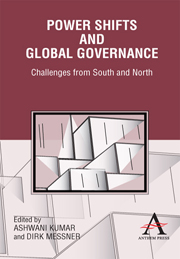Book contents
- Frontmatter
- Contents
- List of Contributors
- Foreword
- Power Shifts and Global Governance
- Part One Theoretical and Analytical Reflections on Global Governance
- Part Two Power Shifts, Regional Experiences and Global Challenges
- 7 Global Power Shifts and South Africa's Southern Agenda: Caught between African Solidarity and Regional Leadership
- 8 Mexico as an Emerging Power in the Present World Scenario: Global Economy without National Development Strategy?
- 9 Trilateral Relations among Africa, China and Europe: A Chinese Perspective
- 10 South America and US Relations: Implications for Regional Security
- 11 The Future Developments in Global Governance – Multilateralism & Regionalization Process: India's Role
- 12 Managing Social Issues for Sustainable Development: The Indian Experiences
- Part Three Case Studies in Global Governance
- Notes
7 - Global Power Shifts and South Africa's Southern Agenda: Caught between African Solidarity and Regional Leadership
from Part Two - Power Shifts, Regional Experiences and Global Challenges
Published online by Cambridge University Press: 05 March 2012
- Frontmatter
- Contents
- List of Contributors
- Foreword
- Power Shifts and Global Governance
- Part One Theoretical and Analytical Reflections on Global Governance
- Part Two Power Shifts, Regional Experiences and Global Challenges
- 7 Global Power Shifts and South Africa's Southern Agenda: Caught between African Solidarity and Regional Leadership
- 8 Mexico as an Emerging Power in the Present World Scenario: Global Economy without National Development Strategy?
- 9 Trilateral Relations among Africa, China and Europe: A Chinese Perspective
- 10 South America and US Relations: Implications for Regional Security
- 11 The Future Developments in Global Governance – Multilateralism & Regionalization Process: India's Role
- 12 Managing Social Issues for Sustainable Development: The Indian Experiences
- Part Three Case Studies in Global Governance
- Notes
Summary
Introduction
The central argument of this paper is that the global power shifts experienced in the world in the first decade of the twenty-first century provide a unique opportunity for South Africa to pursue more effectively one of its key foreign policy objectives, viz. reforming the institutions of global governance, which project outdated power configurations. It is doing this by developing strong alliances with like-minded countries of the developing south, such as India, Brazil and China. However, its close alignment with big emerging powers sometimes clashes with its commitment that Africa is at the centre of its foreign policy agenda. This contradiction in its foreign policy is unlikely to be resolved in the medium term, and may also become more difficult to manage as the balance of power shifts more dramatically to the new Asian Drivers.
South Africa has sought to emphasize that it is part of Africa and that it places its interests at the top of its foreign policy agenda. However, as the largest and most developed economy on the world's poorest continent, South Africa's interests, global perspective and objectives are often very different from those of many other African countries. While the country shirks the title of regional hegemon because of its apartheid past, its actions (political or economic) are often perceived in this light by others in Africa. Thus South Africa is both a part of, and yet apart from, the continent.
- Type
- Chapter
- Information
- Power Shifts and Global GovernanceChallenges from South and North, pp. 141 - 152Publisher: Anthem PressPrint publication year: 2010
- 1
- Cited by



